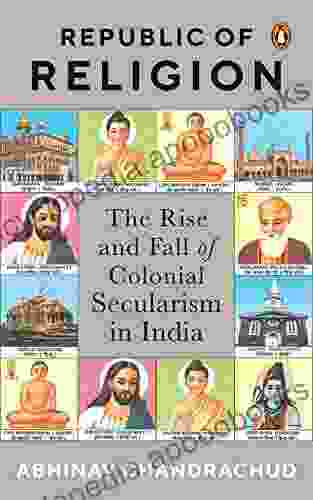The Rise and Fall of Colonial Secularism in India: A Journey Through History

The concept of secularism has played a significant role in shaping the political and social fabric of India. During the colonial period, the British Empire introduced secularism as a means to maintain control over a diverse population. However, the nature and implementation of secularism in India have been a subject of ongoing debate and evolution. This article delves into the rise and fall of colonial secularism in India, exploring its origins, complexities, and lasting impact.
The Roots of Colonial Secularism
The roots of colonial secularism in India can be traced back to the 18th century. As the British East India Company expanded its influence and established itself as the dominant power, it encountered a diverse population with a multitude of religious beliefs and practices. Faced with the challenge of governing such a diverse society, the British adopted a policy of non-interference in religious matters. This approach, known as Warren Hastings' Regulation of 1772, aimed to maintain social harmony and prevent religious conflicts.
4.5 out of 5
The Development of Secular Institutions
During British rule, the concept of secularism influenced the development of various institutions and policies. The establishment of the Indian Civil Service (ICS) in 1858 was a significant milestone. The ICS was a merit-based, non-religious bureaucracy that replaced the previous system of patronage and favoritism. This reform aimed to create an impartial administrative apparatus that transcended religious and caste divisions.
The establishment of the Indian National Congress in 1885 further contributed to the development of secular politics. The Congress, led by prominent nationalist leaders such as Dadabhai Naoroji and Jawaharlal Nehru, advocated for a united front against British rule, regardless of religious affiliation. The Indian National Army (INA),formed during World War II by Subhas Chandra Bose, also emphasized a secular ideology, seeking to unite Indians of all religions against the British.
The Limits of Secularism
Despite the of secular institutions and policies, the implementation of secularism in India was not without its challenges. The British colonial government maintained a hierarchical social Free Download that favored certain religious communities over others. This hierarchy was evident in the differential treatment of religious groups in areas such as education, employment, and legal rights.
Furthermore, the British policy of non-interference in religious matters sometimes led to the perpetuation of discriminatory practices sanctioned by religious authorities. For example, the caste system, which was deeply intertwined with religious beliefs, continued to shape social and economic relations within Indian society.
The Impact of Nationalism
The rise of Indian nationalism in the early 20th century posed a significant challenge to colonial secularism. Many nationalist leaders began to question the neutrality of the British colonial state and its impartiality towards different religious communities. The demand for self-rule and independence from British rule was often intertwined with religious sentiments and aspirations.
The Indian National Congress itself underwent a shift towards a more explicitly secular ideology. Under the leadership of Mahatma Gandhi, the Congress advocated for a united and inclusive nation where religious identities were secondary to a common Indian identity. However, this vision of secularism faced resistance from various religious groups who sought to protect their own interests and privileges.
The Partition of India
The most significant failure of colonial secularism in India was the partition of the country in 1947. The partition, which divided India into Hindu-majority India and Muslim-majority Pakistan, was a result of the failure of the British colonial government to manage the communal tensions and rising nationalism among different religious groups.
The partition led to widespread violence and displacement, with an estimated 1 million people killed in the communal riots. The experience of partition left a deep scar on the psyche of the Indian people and continues to impact relations between India and Pakistan today.
The Rise of Independent India
After independence, India adopted secularism as one of the fundamental principles of its constitution. Article 25 of the Indian Constitution guarantees freedom of religion and the right to practice, propagate, and convert. The state is prohibited from discriminating against any citizen on the basis of religion, and all religions are treated equally before the law.
Despite the constitutional provisions, the implementation of secularism in post-independence India has been a complex and ongoing process. Various religious groups have asserted their influence in the political and social spheres, leading to conflicts and tensions at times. The rise of Hindu nationalism in recent years has also brought the concept of secularism into question.
The Future of Secularism in India
The future of secularism in India remains uncertain. While it remains a core principle of the Indian constitution, its interpretation and implementation are subject to ongoing debate and contestation. The rise of religious nationalism, communal tensions, and the challenges of social justice and inclusiveness present significant challenges to the ideal of secularism.
The key to maintaining a truly secular India lies in fostering a culture of mutual respect, dialogue, and understanding among different religious groups. Education, interfaith initiatives, and legal reforms that promote equality and justice for all citizens are essential steps towards preserving the secular fabric of Indian society.
The rise and fall of colonial secularism in India is a complex and multifaceted story that has shaped the nation's history and continues to influence its present and future. From the of secular policies by the British to the challenges of nationalism and partition, the concept of secularism has been constantly contested, reinterpreted, and redefined.
While India remains committed to the ideal of secularism as enshrined in its constitution, the ongoing debates and challenges faced by the nation highlight the importance of continued vigilance and collective efforts to ensure that secularism remains a living reality for all Indians. Only through a commitment to mutual respect, inclusiveness, and justice can India truly fulfill its promise as a secular and harmonious nation.
4.5 out of 5
Do you want to contribute by writing guest posts on this blog?
Please contact us and send us a resume of previous articles that you have written.
 Book
Book Novel
Novel Page
Page Chapter
Chapter Text
Text Story
Story Genre
Genre Reader
Reader Library
Library Paperback
Paperback E-book
E-book Magazine
Magazine Newspaper
Newspaper Paragraph
Paragraph Sentence
Sentence Bookmark
Bookmark Shelf
Shelf Glossary
Glossary Bibliography
Bibliography Foreword
Foreword Preface
Preface Synopsis
Synopsis Annotation
Annotation Footnote
Footnote Manuscript
Manuscript Scroll
Scroll Codex
Codex Tome
Tome Bestseller
Bestseller Classics
Classics Library card
Library card Narrative
Narrative Biography
Biography Autobiography
Autobiography Memoir
Memoir Reference
Reference Encyclopedia
Encyclopedia Michelle Pearce
Michelle Pearce Joseph Sobran
Joseph Sobran Aleta Medea
Aleta Medea Jean Marc Martin
Jean Marc Martin Tony Sclafani
Tony Sclafani James Morelan
James Morelan A A Villa
A A Villa 2008th Edition Kindle Edition
2008th Edition Kindle Edition 1st Edition
1st Edition Ann Napolitano
Ann Napolitano Merline Lovelace
Merline Lovelace Tania Peitzker
Tania Peitzker Harvey Fierstein
Harvey Fierstein David Lange
David Lange Abram Chasins
Abram Chasins Jack Wintz
Jack Wintz Stephanie L Mudge
Stephanie L Mudge Timothy J Cooley
Timothy J Cooley Mitch Greenhill
Mitch Greenhill Kindle Comixology
Kindle Comixology
Light bulbAdvertise smarter! Our strategic ad space ensures maximum exposure. Reserve your spot today!

 Samuel Taylor ColeridgeAn Introduction to Everything from Organization to Assessment: A...
Samuel Taylor ColeridgeAn Introduction to Everything from Organization to Assessment: A...
 Wayne CarterUnlocking the Power of Evidence-Based Practices for Student Success: Explore...
Wayne CarterUnlocking the Power of Evidence-Based Practices for Student Success: Explore... Branson CarterFollow ·2.4k
Branson CarterFollow ·2.4k Easton PowellFollow ·5.8k
Easton PowellFollow ·5.8k David PetersonFollow ·14.2k
David PetersonFollow ·14.2k Ted SimmonsFollow ·9.4k
Ted SimmonsFollow ·9.4k Eliot FosterFollow ·4.4k
Eliot FosterFollow ·4.4k Gil TurnerFollow ·11.6k
Gil TurnerFollow ·11.6k Xavier BellFollow ·3k
Xavier BellFollow ·3k Francis TurnerFollow ·5.3k
Francis TurnerFollow ·5.3k

 Jacob Hayes
Jacob HayesUnlock the Power of Microsoft Word: A Comprehensive Guide...
Microsoft Word is a widely used word...

 Hunter Mitchell
Hunter MitchellAndrea Carter and the Price of Truth: A Thrilling...
Get ready for an unforgettable...

 Ivan Turner
Ivan TurnerTrading Jeff and His Dog: An Unforgettable Adventure of...
Get ready for an emotional rollercoaster...

 Langston Hughes
Langston HughesGo Viral TikTok: The Ultimate Guide to Gaining 100K...
TikTok has emerged as a social...

 Ibrahim Blair
Ibrahim BlairUnveil the Enchanting Realm of Short Fiction: Dive into...
Delve into a Literary Tapestry of...

 Tennessee Williams
Tennessee WilliamsUnveil the Enchanting World of Elizabeth Barrett...
A Poetic Tapestry of Love, Loss, and...
4.5 out of 5







